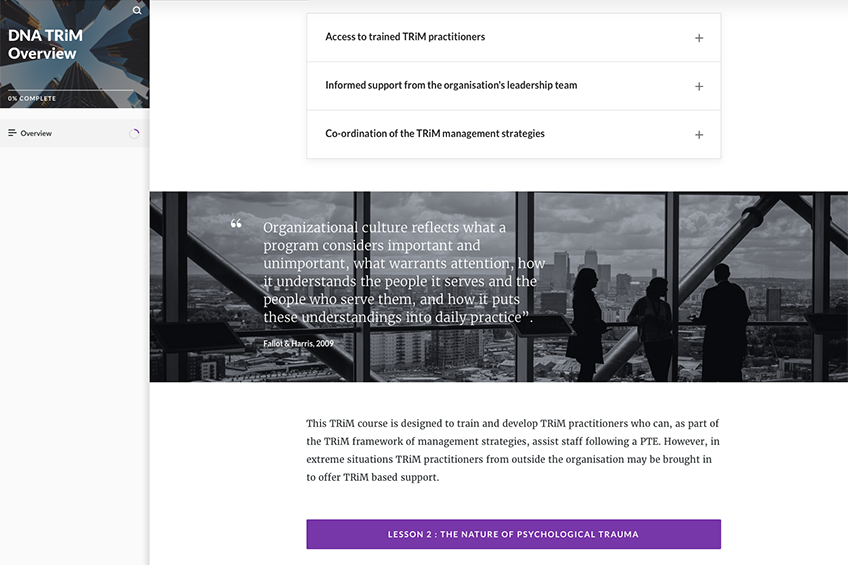

Looking after staff after a potentially traumatic experience (PTE) is both morally justified and, after work-related traumatic incidents, legally necessary. Additionally, it makes sound economic sense to avoid the loss of valuable personnel to the effects of psychological trauma. There is ample evidence that people exposed to work related stress are likely to be less effective at work, more likely to be absent from work and to suffer poor mental health. Stress and poor mental health are recognised nationally as two of the most recurrent causes of sickness absence (ONS, 2017).

TRiM is a proactive approach which aims to ensure that colleagues are supported following any PTE experienced at work. The aim is to address the legal, moral and ethical organisational duty of care by providing clear management strategies and to offer meaningful peer group interaction and support with minimal disruption.
DNA TRiM evolved from a course called trauma risk management that was first developed in the UK military (where it continues to be used) that has been adapted to specific organisational structures, with the inclusion of evidence based resilience strategies. The philosophy of TRiM is to do no harm and to put trauma awareness and support at a grass roots level, rather than keeping it ‘in the hands of experts’. Therefore, it can be an integral part of an organisation or consortium's development of a trauma informed system. For consistency, throughout this course, organisation will be used as the generic descriptive term for all workplace settings.
The TRiM model is based on ‘watchful waiting’. This means keeping a watchful eye on colleagues who have been exposed to a PTE, whether that person has been directly involved or involved from afar.
TRiM is initiated in response to a PTE and has a follow-up component that is designed to detect those who continue to be affected by the experience over time.
However, the same support and follow-up component can be offered to colleagues who are in distress as the result of ongoing, accumulated demands rather than a single PTE. For the purposes of delivering this online course, for the most part, the TRiM approach will be taught with reference to a single PTE.
Our DNA TRiM courses are available in a face to face or online blended learning format.
Should a virtual format be required we already have a proven and successful online, blended delivery option utilising our secure learning portal. To achieve this, the course progresses systematically through a number of discreet stages. These are :

The online learning segment of the DNA TRiM Practitioner course is in 3 parts :
The online learning is followed by a Consolidation Webinar including practical training and role play through our bespoke facility.
On completion of the course, delegates receive their DNA TRiM Accredication Certificates at the approriate level and have access to additional resources and continued support and advice from our expert facilitators.
For an overview of our DNA TRiM Practitioner Online Course - Click Here
In addition to achieving DNA TRiM Practitioner or DNA TRiM Manager status, our DNA TRiM courses are accredited on the Credit and Qualifications Framework for Wales (CQFW), on the Quality Assured Lifelong Learning Pillar of the framework (QALL). This means that they are fully accredited units which have a level and which carry credits which are equivalent to those on the regulated qualifications frameworks in England, Scotland and Northern Ireland, and they are fully recognised and understood across Europe because they articulate with the European Qualifications Framework (EQF) and to the frameworks of other countries, making them internationally recognised.
We have worked with Agored Cymru, the Welsh Awarding Body to gain this accreditation, and as a result of their inclusion in the CQFW, they meet regulatory requirements, are aligned to the respective frameworks and meet national education priorities.

In summary, we can offer -
Qualification providers can use QALL credits for Recognition of Prior Learning (RPL) and where appropriate for direct credit transfer i.e. transfer of that credit within and between education providers."
TRiM training is generally delivered at different levels. Although the details of training may vary between training organisations, the general training is provided at Practitioner (foundation) level and Strategic Leaders (advanced) level.
At DNA TRiM, we have added an additional TRiM Organisational Awareness (introductory level), which has proven to be very popular.



